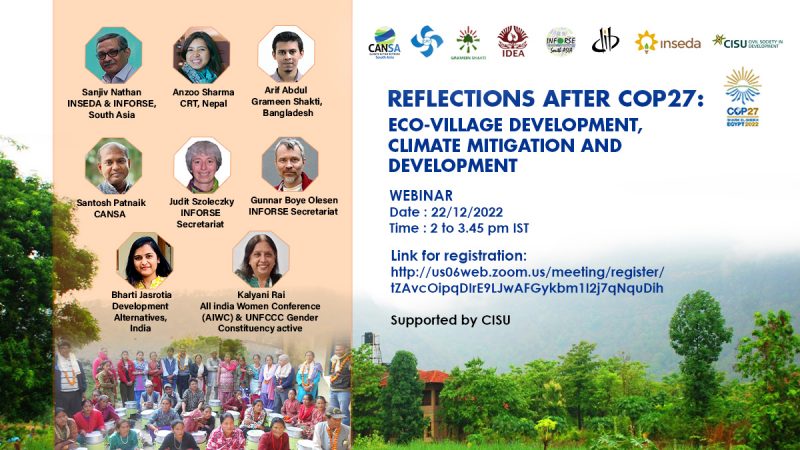Reflections after COP27: Eco-Village Development, Climate Mitigation and Development

Get the story directly from the people who were there:
Webinar 22/12 2-3.45 pm IST
Link for registration:
https://us06web.zoom.us/meeting/register/tZAvcOipqDIrE9LJwAFGykbm1I2j7qNquDih
Program
- Welcome by organisers (5 min.)
- Eco-Village Development (EVD) and climate mitigation, EVD solutions’ contributions to reduce emissions. What are opportunities for earning climate credits with EVD solutions? Sanjiv Nathan INSEDA and INFORSE South Asia (10 min)
- Reflections on UN Climate COP27, how were EVD local solutions received by officials and civil society? Meet the EVD -team participated at the COP27 from Bangladesh, India, Nepal, Sri Lanka, and Denmark. Illustrated with pictures from COP27. Panel introductions by Anzoo Sharma from CRT Nepal, Arif Abdul Grameen Shakti Bangladesh, Santosh Patnaik, CANSA and Judit Szoleczky from INFORSE Secretariat (3 min. each with focus on COP27, pictures from COP27. 15 min in total)
- Dialogue 1: Questions and comments from webinar participants (15 min)
- EVD and the COP27 results. How do international climate agreements help EVD and other local solutions? And how can international cooperation help to unleash the climate and development potentials of local solutions? Gunnar Boye Olesen, INFORSE Secr. (10 min)
- Local solutions and the COP27 results. How do Development Alternatives sees the international climate cooperation and the UNFCCC process and its role to support local, low-carbon development with poverty reduction? By Bharti Jasrotia, Development Alternatives, India (invited, tbc) (10 min)
- Local solutions and the COP27 results. What does the Women and Gender Constituency (WGC) expect from international climate cooperation after COP27 for development with poverty reduction and local solutions, and what WGC is doing, Kalyani Rai, All india Women Conference (AIWC) and UNFCCC Gender Constituency active (5-10 min)
Panel debate and open debate with webinar participants on the themes
1. How do international climate agreements help EVD and other local solutions? And how can international cooperation help to unleash the climate and development potentials of local solutions?
2. How to strengthen the promotion of EVD and other local solutions with international cooperation and related policies (30 min)
Background
Eco-Village Development is a concept that combines a number of local solutions that assist villagers in South Asia with solutions for better access to energy and other development aspects in ways that contribute to climate actions and a development towards a low-carbon society. To increase climate action, these local solutions should be the centre-stage of climate policies and international climate cooperation. At this webinar we will highlight how these local solutions can contribute to reduce emissions and to other climate objectives. The webinar will also include a status of how local solutions can be prioritised in the implementation of the Paris Agreement and in national climate plans after the decisions at climate COP27 in November 2022. The last part of the webinar will be an open debate, where all participants are invited to comment, ask questions etc.
The webinar is organised by International Network for Sustainable Energy – South Asia, Climate Action Network South Asia and partners including INSEDA, India; Grameen Shakti, Bangladesh; CRT Nepal, IDEA Sri Lanka, INFORSE and DIB, Denmark with support from Civil Society in Development (CISU), Denmark.
See more
Side Event at COP27: https://www.inforse.org/cop27.php
EVD Polcicy Brief for COP27: https://www.inforse.org/asia/pdf/EVD_PolicyBrief_GST_UNFCCC_Nov12_2022.pdf
Local climate solutions database: https://www.inforse.org/evd




